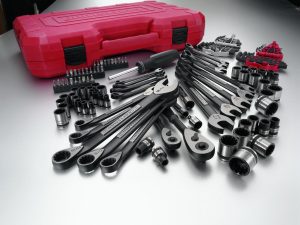- About Ramapo
- Academics
- Admissions & Aid
- Student Life
- Athletics
- Alumni
- Arts & Community
- Quick Links
- Apply
- Visit
- Give
Ramapo College Articles
The Retooling Of An American Craftsman
The recent announcement that Sears was selling its Craftsman tools brand to Stanley Black & Decker for $900 million was just the latest reminder of the slow demise of this once iconic American company whose history dates back to the late 1880s. With its reputation for quality, durability and lifetime guarantee, no other retailer in the last century has had a bigger hand in building America. Yet, for all its success Sears was unable to build a beachfront capable of withstanding the ebb and flow of free market capitalism.

In the hands of its new owner, Craftsman will join two other iconic brands, and presumably return to its preeminent position among tool manufacturers. Countless weekend warriors – count me among them – will no doubt cheer the news and look forward to filling those red & black toolboxes with the latest gadgets.
News of the sale was accompanied by plans to close 26 stores on top of the 16 closures announced on December 27. Sears wasn’t the only storied retailer to report closings. That same week Macy’s announced plans to close 68 stores, Kmart said it will close 78 stores and The Limited said it plans to shut all of its nearly 250 stores. News of trouble among brick and mortar retailers is not new or even surprising; the seeds of their demise were set some time ago with the emergence of online retailing and big box competitors.
Over the years, retailers have had more than their fair share of misplaced hammer strikes but not all of them have been self-inflicted. Though Sears’ long-term viability is questionable, its enviable record of creating value for its shareholders is not. This mighty conglomerate boasts of creating some of the most successful brands in corporate history: Allstate, Craftsman, DieHard, Discover Card, and Kenmore.
For a over a century, legions of Sears devotees anxiously awaited the publishing of the latest Sears, Roebuck & Co. catalog, much like today’s Millennials await the unveiling of the latest smart phone. The catalog, which ceased publication in 1993, contained thousands of items including apparel, sewing machines, appliances, televisions, power tools, even a kit to build an entire home. Its pages were filled with celebrities and fashion models that for generations would both mirror and set the standard for what filled American households.
Not content to rest on its laurels, Sears acquired Dean Witter Reynolds and Coldwell Banker in the early 1980s and, together with Allstate, became a major player in the burgeoning financial services industry. Over the years, management demonstrated a masterful skill for anticipating new market opportunities.
But the Craftsman sale and store closings are a stark reminder that capitalism harbors no nostalgia for the past. As the arbitrator between winners and losers in a market-based economy, capitalism is often criticized for its coldhearted, indifferent and unemotional execution. But that is precisely why it functions so well. Its renderings are based on economic returns, which lie at the center of what makes the US economy the envy of the world. Emotions play a big part in driving individual decisions and behaviors, but capitalism itself is governed by the collective wisdom of the masses.
Confidence in a market system doesn’t diminish the need to acknowledge the human toll of business failures or eliminate the empathy that follows. Nor does it eliminate the need for market intervention. Store closings and layoffs are troubling at a local level, but at the macro level they provide sure evidence of capitalism’s great promise. The economist Joseph Schumpeter called this process creative destruction, i.e., the relentless innovation of new products and processes to replace the existing ones.
Innovation is the lifeblood of our economy and thanks to the ingenuity of American craftsmanship, there is no shortage of new ideas or businesses for us to admire. Entrepreneurs toil away in garages and coffee shops across the country plotting to launch the next generation of products and services; new business models appear overnight to take advantage of new technologies and ways of operating; and new retailers emerge to replace the old.
No matter what happens to Sears, its contributions to the American economy are well preserved. So, go ahead – pick up a tool and make your mark on the world.
Categories: MBA
Copyright ©2024 Ramapo College Of New Jersey. Statements And Policies. Contact Webmaster.

Follow Ramapo